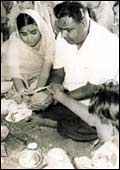 |
| Dhirubhai and wife at Naroda Bhoomipujan |
Dec 28, 1932: Dhirajlal
Hirachand Ambani, the third of five children, is born at Chorwad,
Gujarat, to trader-turned-school teacher Hirachand Ambani and Jamunaben.
1948: Finishes school at the age of
16, and is recommended to A. Besse & Co. in Aden by his elder
brother, Ramnikbhai.
1958: Returns to India and starts Reliance
Commercial Corp. in a 350-sq ft office in Mumbai's Masjid Bandar
district to trade in synthetic yarn.
1965: Differences crop up between Dhirubhai
and partner Champaklal Damani, and the former buys out the latter's
stake for Rs 6 lakh.
1966: Dhirubhai gets into textile manufacturing
with Reliance Textiles, installing four machines in a 10,000-sq
mt plot in Naroda. In the first full year of production in 1967,
sales touch Rs 90 lakh and profits, Rs 13 lakh.
1977: Reliance goes public, offering
2.8 million shares.
1980: Reliance receives licence for
the Patalganga project, marking its first step in backward integration.
1982: The polyester plant goes into
production in a record 18 months.
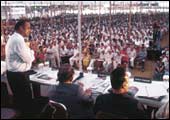 |
| Dhirubhai at the 1985 AGM |
1985: Total assets cross Rs 1,000 crore.
1986: The PSF plant at Hazira goes on
stream.
1988: Sales cross Rs 1,000 crore. Reliance
raises more than Rs 500 crore for its Hazira project. In October,
Reliance suddenly emerges as the single-largest private shareholder
in engineering firm, Larsen & Toubro. The Patalganga paraxylene
plant receives refinery status.
1989: Patalganga plant is flooded because
of torrential rain. Mukesh Ambani and others pull off a stunning
recovery operation.
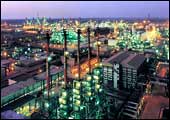 |
|
Reliance's Hazira complex
|
1992: Reliance becomes the first Indian
company to make a Euro GDR.
1993: Reliance, with sales of more than
Rs 4,000 crore, overtakes Tisco as the largest private company in
India. Reliance Petroleum makes the biggest IPO ever.
1994: Makes the second global depository
receipt (GDR) issue.
1995: Net profits touch Rs 1,065 crore,
the highest ever achieved by an Indian company.
1995-96: Reliance becomes the first private
sector company to be rated by international credit rating agencies.
|
|
|
Anil Ambani announcing RIL-RPL merger
|
1996-97: The Rs 9,000-crore Hazira complex
goes on stream. Reliance becomes the first corporate in Asia to
issue 50- and 100-year bonds in the US debt market.
1998: Total assets cross Rs 35,000 crore,
and revenues exceed Rs 14,000 crore.
1999-2000: The Rs 25,000-crore Jamnagar
petrochem complex and most of the refinery goes on stream. With
that, Reliance gets to boast of world's largest grassroots refinery,
paraxylene plant, and polypropylene plant. Foray into telecom is
announced.
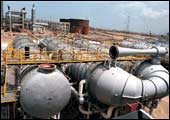 |
|
Reliance's mega project: The Jamnagar facility
|
2001: Reliance Industries and Reliance
Petroleum become the two largest companies in India. Reliance Infocom
announces a Rs 25,000-crore investment plan. Group revenues cross
Rs 60,000 crore. Reliance becomes the largest group in India.
2002: Reliance Petroleum merges with
Reliance Industries. The new company acquires a 26 per cent stake
in IPCL, India's No. 2 petrochem company.
June 24, 2002: Dhirubhai suffers his
second stroke, and is admitted to Breach Candy Hospital in Mumbai.
June 26, 2002: Reliance mops up Rs 100
crore via a 12-year paper.
RELIANCE AND CONTROVERSY
July 1979: Morarji Desai-led Janata
government falls. Dhirubhai is suspected of helping Indira Gandhi
return to power.
March/April 1982: RIL stock is hammered
by a bear cartel ahead of its debenture issue. Reliance brokers
swing into action, mop up some 8 lakh shares at a cost of Rs 10
crore; bears suffer huges losses.
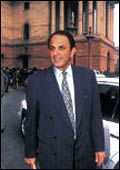 |
|
Bombay Dyeing's Nusli Wadia
|
May 1983: Reliance is accused of using
companies registered in the Isle of Man to buy its own shares at
below market price. Investigations lead to deadend.
1984: What would later get dubbed as
a polyester war starts with Reliance on one side and Nusli Wadia
of Bombay Dyeing and Kapal Mehra of Orkay Silk Mills on the other.
April 1985: Finance Minister V P Singh
orders tax raids on companies, including Reliance.
May 1985: Reliance faces a profit crunch;
a defiant Dhirubhai holds a mammoth AGM in Bombay's Cooperage Football
Grounds, attracting some 12,000 shareholders.
June 1985: Reliance drops Textiles from
its name and adds Industries to signify its new growth ambitions.
1986: Dhirubhai suffers a stroke in
February, even as S Gurumurthy-backed by Ramnath Goenka of Indian
Express-launches a series of exposes on Reliance, including alleged
under-invoicing of plant and machinery. Enforcement Director Bhure
Lal launches investigation into Reliance's overseas transactions.
August 1987: Nusli Wadia is arrested
by the CBI. Reliance's hand in the arrest is alleged.
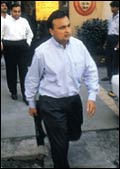 |
|
Anil & Mukesh walking out of L&T House
|
October 1988: Reliance takes over L&T
and appoints Mukesh Ambani and M L Bhakta as directors.
August 1989: Kirti Ambani, a Reliance
general manager, is arrested and charged with conspiracy to murder
Nusli Wadia.
August 1991: FIs bring pressure on Reliance
over L&T takeover. In an EGM called to approve Mukesh Ambani's
appointment as L&T managing director, the two brothers are booed
out.
April 1992: The Harshad Mehta securities
scam blows up. Reliance's involvement is widely suspected.
October 1995: The Bombay Stock Exchange
issues a show cause notice to Reliance over duplicate shares issue
to Rajul Vasa, Dhirubhai's physiotherapist.
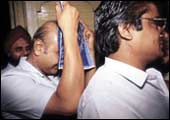 |
|
Kirti Ambani being taken away by sleuths
|
Nov. 1995: Reliance threatens to delist
itself from the Bombay Stock Exchange, which it accuses of siding
with bear operators. BSE refuses delisting.
Dec. 1995: Finance minister Manmohan
Singh orders a joint enquiry by Sebi and DCA into the duplicate
shares issue.
October 1998: A raid at Reliance' Delhi
office recovers confidential government documents from locked drawers
of President V. Balasubramaniam.
April 2002: A Delhi court remands group
Vice President A N Sethuraman and Corporate Affairs GM Shekhar Adawal
to 14 days' judicial custody.
1
2
3
|

